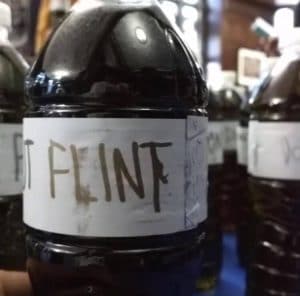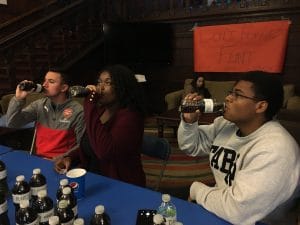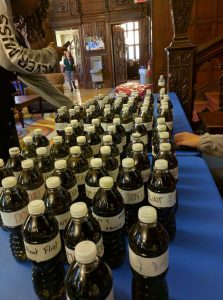By Marrissa Ballard | Co-Editor-in-Chief
On Wednesday, the Black Student Union held a demonstration in the Wakehurst lobby to raise awareness about the Flint Water Crisis. Flint, a city in Michigan, made national news last year when its water was shown to contain high amounts of lead. Because Flint’s population is primarily made up of African Americans, the water crisis was also seen by many citizens as an example of environmental racism.
 Patricia Socarras, President of the BSU, organized the demonstration. “I was thinking about the Dakota Access Pipeline, and then I was thinking about Flint because they’re both products of the same problem,” explains Socarras.
Patricia Socarras, President of the BSU, organized the demonstration. “I was thinking about the Dakota Access Pipeline, and then I was thinking about Flint because they’re both products of the same problem,” explains Socarras.
Socarras, as well as many members of the BSU, felt that the public had forgotten about the crisis as soon as it was no longer a part of the mainstream news cycle. “I couldn’t believe that people forgot about Flint,” she says.
The dyed water bottles were meant to represent the lead-contaminated water. In taking the water bottles, “People could put themselves in the shoes of the people in Flint, even just for a second,” says Socarras. “You can choose to drink this water bottle or not, but people in Flint don’t have that choice.”

Members of the BSU helped pass out the water bottles and explain the cause. Alessio Ayuninjam, a junior Graphic Design Major and BSU’s Public Relations Coordinator, explained that their goal was to inform students. “We were thinking about different things we should look at as BSU, and the Flint Water Crisis came up as being a big issue that has been kind of swept under the rug,” says Ayuninjam.
According to Ayuninjam, many students were unaware of the issue and did not realize its scope. “Many people have been affected by the heavy lead in the water supply, and it has killed people and affected thousands,” he says.
Toyosi Akanji, a sophomore and the Vice President of BSU, saw the demonstration as an opportunity to talk about how Salve students in particular should know about events like the Flint Water Crisis. “This is something we as a university should look into, because we care about the five critical concerns of mercy and two of those are environmental issues and racism,” says Akanji. “As college students, we are very influential in politics, and we need to stand up and tell the politicians that this is what we care about as a Salve community.”
She also hopes that thinking about Flint will help put things into perspective for students. “I hope that it continues the conversation so people realize that there are a lot of things going on in our environment and a lot of things going on institutionally that are affecting  minorities and marginalized groups,” she says. “Just because we have clean water at Salve doesn’t mean that everyone does.”
minorities and marginalized groups,” she says. “Just because we have clean water at Salve doesn’t mean that everyone does.”
Likewise, Patricia Socarras hopes that the demonstration helps students reflect on their own position in society. “I hope people think about their place in the world and think about how their actions matter, even though Flint is all the way in Michigan,” says Socarras. “This could happen in Flint, and it could happen on the other side of Newport.”
Overall, Socarras hopes that the event served to educate the Salve community as a whole. “I hope it makes people aware that Flint happened, because some people have asked ‘what was Flint?’” explains Socarras. “I hope it makes people aware that the problem is still happening.”














